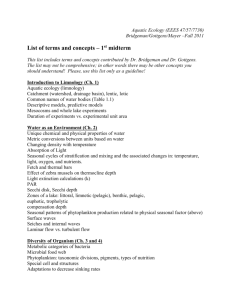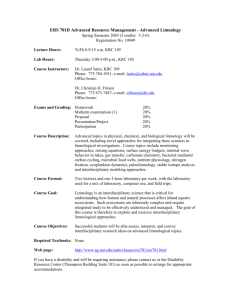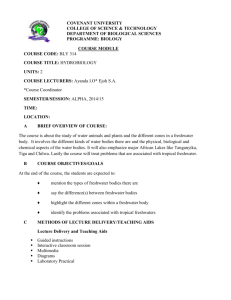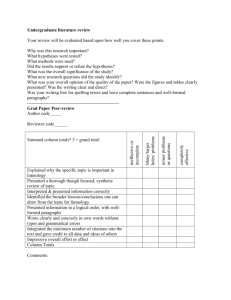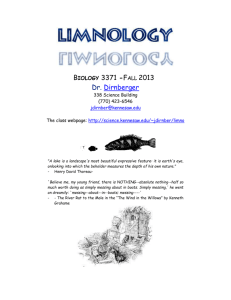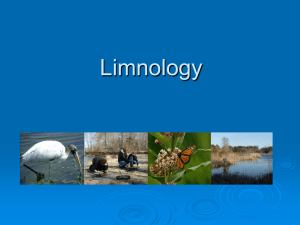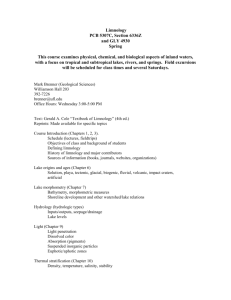Limnology: FISH 5320/6320 Spring 2014 Pg. 1
advertisement
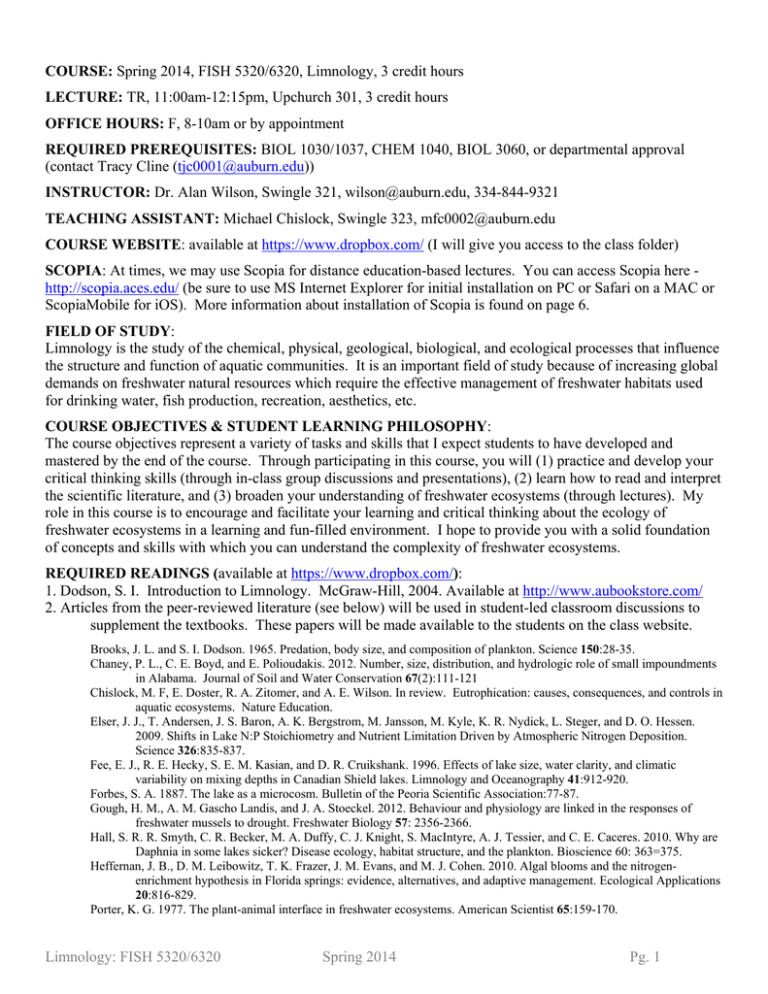
COURSE: Spring 2014, FISH 5320/6320, Limnology, 3 credit hours LECTURE: TR, 11:00am-12:15pm, Upchurch 301, 3 credit hours OFFICE HOURS: F, 8-10am or by appointment REQUIRED PREREQUISITES: BIOL 1030/1037, CHEM 1040, BIOL 3060, or departmental approval (contact Tracy Cline (tjc0001@auburn.edu)) INSTRUCTOR: Dr. Alan Wilson, Swingle 321, wilson@auburn.edu, 334-844-9321 TEACHING ASSISTANT: Michael Chislock, Swingle 323, mfc0002@auburn.edu COURSE WEBSITE: available at https://www.dropbox.com/ (I will give you access to the class folder) SCOPIA: At times, we may use Scopia for distance education-based lectures. You can access Scopia here http://scopia.aces.edu/ (be sure to use MS Internet Explorer for initial installation on PC or Safari on a MAC or ScopiaMobile for iOS). More information about installation of Scopia is found on page 6. FIELD OF STUDY: Limnology is the study of the chemical, physical, geological, biological, and ecological processes that influence the structure and function of aquatic communities. It is an important field of study because of increasing global demands on freshwater natural resources which require the effective management of freshwater habitats used for drinking water, fish production, recreation, aesthetics, etc. COURSE OBJECTIVES & STUDENT LEARNING PHILOSOPHY: The course objectives represent a variety of tasks and skills that I expect students to have developed and mastered by the end of the course. Through participating in this course, you will (1) practice and develop your critical thinking skills (through in-class group discussions and presentations), (2) learn how to read and interpret the scientific literature, and (3) broaden your understanding of freshwater ecosystems (through lectures). My role in this course is to encourage and facilitate your learning and critical thinking about the ecology of freshwater ecosystems in a learning and fun-filled environment. I hope to provide you with a solid foundation of concepts and skills with which you can understand the complexity of freshwater ecosystems. REQUIRED READINGS (available at https://www.dropbox.com/): 1. Dodson, S. I. Introduction to Limnology. McGraw-Hill, 2004. Available at http://www.aubookstore.com/ 2. Articles from the peer-reviewed literature (see below) will be used in student-led classroom discussions to supplement the textbooks. These papers will be made available to the students on the class website. Brooks, J. L. and S. I. Dodson. 1965. Predation, body size, and composition of plankton. Science 150:28-35. Chaney, P. L., C. E. Boyd, and E. Polioudakis. 2012. Number, size, distribution, and hydrologic role of small impoundments in Alabama. Journal of Soil and Water Conservation 67(2):111-121 Chislock, M. F, E. Doster, R. A. Zitomer, and A. E. Wilson. In review. Eutrophication: causes, consequences, and controls in aquatic ecosystems. Nature Education. Elser, J. J., T. Andersen, J. S. Baron, A. K. Bergstrom, M. Jansson, M. Kyle, K. R. Nydick, L. Steger, and D. O. Hessen. 2009. Shifts in Lake N:P Stoichiometry and Nutrient Limitation Driven by Atmospheric Nitrogen Deposition. Science 326:835-837. Fee, E. J., R. E. Hecky, S. E. M. Kasian, and D. R. Cruikshank. 1996. Effects of lake size, water clarity, and climatic variability on mixing depths in Canadian Shield lakes. Limnology and Oceanography 41:912-920. Forbes, S. A. 1887. The lake as a microcosm. Bulletin of the Peoria Scientific Association:77-87. Gough, H. M., A. M. Gascho Landis, and J. A. Stoeckel. 2012. Behaviour and physiology are linked in the responses of freshwater mussels to drought. Freshwater Biology 57: 2356-2366. Hall, S. R. R. Smyth, C. R. Becker, M. A. Duffy, C. J. Knight, S. MacIntyre, A. J. Tessier, and C. E. Caceres. 2010. Why are Daphnia in some lakes sicker? Disease ecology, habitat structure, and the plankton. Bioscience 60: 363=375. Heffernan, J. B., D. M. Leibowitz, T. K. Frazer, J. M. Evans, and M. J. Cohen. 2010. Algal blooms and the nitrogenenrichment hypothesis in Florida springs: evidence, alternatives, and adaptive management. Ecological Applications 20:816-829. Porter, K. G. 1977. The plant-animal interface in freshwater ecosystems. American Scientist 65:159-170. Limnology: FISH 5320/6320 Spring 2014 Pg. 1 Schindler, D. W. 1974. Eutrophication and recovery in experimental lakes: Implications for lake management. Science 184:897-899. Schindler, D. W., R. E. Hecky, D. L. Findlay, M. P. Stainton, B. R. Parker, M. J. Paterson, K. G. Beaty, M. Lyng, and S. E. M. Kasian. 2008. Eutrophication of lakes cannot be controlled by reducing nitrogen input: Results of a 37-year whole-ecosystem experiment. Proceedings of the National Academy of Sciences of the United States of America 105:11254-11258. Smith, V. H. and D. W. Schindler. 2009. Eutrophication science: where do we go from here? Trends in Ecology & Evolution 24:201-207. Stein, R. A., D. R. DeVries, and J. M. Dettmers. 1995. Food-web regulation by a planktivore: exploring the generality of the trophic cascade hypothesis. Canadian Journal of Fisheries and Aquatic Sciences 52: 2518-2526. Titman, D. 1976. Ecological competition between algae - experimental confirmation of resource-based competition theory. Science 192:463-465. Turner, A. M. and J. P. McCarty. 1998. Resource availability, breeding site selection, and the reproductive success of redwinged blackbirds. Oecologia 113: 140-146. Verburg, P., R. E. Hecky, and H. Kling. 2003. Ecological consequences of a century of warming in Lake Tanganyika. Science 301:505-507. GRADING: Course grades are based on each student's cumulative performance for the following assignments: Activity Lecture - Research articles Lecture - Presentation Lecture - Paper (graduate students only*) Lecture - Midterm exams Lecture - Final exam Total points Points Grading scale 10 A = 90-100% 35 B = 80-89% 25 C = 70-79% 75 D = 60-69% 50 F = 0-59% 170 (undergraduate students) 195 (graduate students*) UNDERGRADUATE PARTICIPATION & ASSIGNMENTS EXPECTATIONS: The course grade will be based on participation in lecture, research article evaluations, quizzes, several presentations, and midterm and final exams as described below: (1) RESEARCH ARTICLES REPORTS: To familiarize you with the primary limnological literature, students will be expected to survey articles in Limnology and Oceanography, Ecology, Canadian Journal of Fisheries and Aquatic Sciences, or the Journal of Freshwater Science and concisely (≤ 1 page) scientifically describe a different article four times throughout the semester. Each student will be given their own year of papers to choose from to prevent duplication of presentations. Article reports should include the article citation, description of why you chose paper, study objectives, methods, novel findings, flaws, and hyperlink to paper. Reports not fitting these criteria will be given a 0. On each due date, one or two students may be randomly chosen to briefly (≤ 5 minutes) present their paper to the class. Reports will be due via email before class on the due date. (2) LECTURE PRESENTATION: All students will be required to give a 10 minute lecture reviewing a predefined limnological topic that the instructor provides. Each student will give a 5 minute lecture and provide an associated 1 page outline in the middle of the semester (see lecture calendar below) so that I can assist with the final presentation development. The students are expected to use the primary literature as references for this presentation. (3) LECTURE MIDTERM EXAMS: Two closed-book midterm exams will test your knowledge of basic facts and your understanding and synthesis of class concepts. The types of questions on the exam may be similar to the questions that are asked during quizzes. The textbook and primary literature readings reinforce the lecture material and will be used to develop exam questions. Exam questions may include true/false, multiple choice, short answer, and essays. Students who are absent from class and miss an exam will be given a 0. Limnology: FISH 5320/6320 Spring 2014 Pg. 2 (4) LECTURE EXAM: The closed-book final exam will be similar to the midterm exams and will be comprehensive. GRADUATE PARTICIPATION & ASSIGNMENTS EXPECTATIONS: Graduate students will be expected to (1) work above and beyond the expectations set forth for undergraduates (see above), (2) think critically about course topics, (3) be class leaders in discussions and actions, (4) to alternate discussion leading of four or five seminal limnological papers throughout the semester using creative teaching techniques, and (5) write a 5-page, well-cited, single-spaced, paper supporting their final oral presentation. CLASSROOM ATTENDANCE & BEHAVIOR: It is recommended to attend class and engage in classroom discussions and in-class group projects. If you choose not to attend class on any day, then you accept the responsibility to learn the material on your own. If you have a question during the class period, please do not hesitate to ask. In fact, other students probably have the same question. It is important to be on time for class since the first 5 minutes of each lecture will establish the direction for that day’s session. Therefore, if you come in late, certain things may not make sense and you will miss important announcements. Throughout the semester, please be courteous to all of your fellow students and to me so we can create a positive learning environment. All cell phones should be turned off before entering the classroom and should not be used during class. FEEDBACK & EVALUATION: This course is for you to learn important fundamental concepts and ideas on which to build your understanding of freshwater ecosystems. I will do my best to create a positive learning environment. However, learning styles differ among students, so I may do some things that are not optimal for you. If this occurs, you can let me know through email or written comments turned in at the end of the class period, during office hours, or via email. Because I need to keep the interest of all students in mind, I cannot promise that I will change the course. However, I do promise to listen and consider your suggestions. Moreover, course evaluations will be completed by students at the middle and end of the semester so that course changes can be made to enhance the learning experience for this class and future classes. Students will also be given an opportunity at the end of most lectures to ask questions about concepts not fully understood via one-minute papers. Some of these questions may be used on quizzes and/or exams. Finally, students are encouraged to use an anonymous online survey form - http://wilsonlab.com/survey.htm COURSE CHANGES: Although I expect to cover all the topics described in the syllabus, course changes will likely occur - especially based on feedback from the students. Consequently, I reserve the right to modify the course to enhance the learning experience where I deem appropriate. Course changes will be described verbally during class and/or in writing via email and/or handouts. ACADEMIC HONESTY: The Auburn University Student Academic Honesty Code (available at https://sites.auburn.edu/admin/universitypolicies/Policies/AcademicHonestyCode.pdf) clearly defines the university’s honesty code. I expect all students to conduct themselves in my class with this Code in mind. I have a zero-tolerance policy for cheating. Cheating is not fair to you and to your colleagues. If you are not sure which activities constitute cheating, please ask me. Some examples of cheating include, but are not limited to the following activities: attempting to pass others’ work as your own (i.e., plagiarism), using crib sheets, or providing exam answers to other students. Students who cheat will receive a 0 on the assignment in question and will most likely fail the course. ACCOMMODATIONS FOR DISABILITIES: If you have a disability and/or a special need that requires accommodations, please inform me immediately so that I can develop a plan to work with you and arrange an appointment with a campus disabilities counselor. Limnology: FISH 5320/6320 Spring 2014 Pg. 3 LECTURE SCHEDULE (available at https://www.dropbox.com/): Date Lecture topic 09-Jan Course introduction and overview 14-Jan 16-Jan What is limnology?, History Lake bathymetry and morphometry Dodson 1 (3-23); Forbes 1887 Dodson 11 (265-290), Fee et al. 1996 21-Jan 23-Jan Origin of lakes; Lake types Water as an environment, Viscosity and Reynold’s numbers Chaney et al. 2012 Dodson 2 (29-38, 50-51) 28-Jan 30-Jan Lake mixing, waves, currents, light, heat Article discussion: Verburg et al. 2003, Dodson 2 (40-56) Verburg et al. 2003 04-Feb Dodson 2 (43-45, 237-239) 06-Feb Seasonal mixing patterns, Oxygen cycle *ARTICLE REPORT #1* Exam review 11-Feb 13-Feb **MIDTERM EXAM #1** Nutrient cycles; stoichiometry None Dodson 10 (231-251); Schindler 1974; Schindler et al. 2008 18-Feb 20-Feb Article discussion: Elser et al. 2009 Single-celled and colonial organisms Elser et al. 2009 Dodson 3 (65-80) 25-Feb 27-Feb Aquatic invertebrates Aquatic invertebrates, vertebrates, *COURSE EVAL* Dodson 4 (85-124), Gough et al. 2012 Dodson 5 (85-138) 04-Mar 06-Mar Plankton population dynamics, *ARTICLE REPORT #2* Community ecology: competition *PROJECT OUTLINE DUE* Dodson 6 (143-157), Porter 1977 Dodson 7 (161-168) 11-Mar 13-Mar SPRING BREAK – NO CLASS SPRING BREAK – NO CLASS Have fun! Be careful! 18-Mar 20-Mar Article discussion: Titman 1976 Community ecology: predation Titman 1976 Dodson 7 (168-182) 25-Mar 27-Mar Article discussion: Hall et al. 2010, *ARTICLE REPORT #3* Seasonal succession, trophic cascades, biomanipulation Hall et al. 2010 Dodson 8 (189-205), Brooks and Dodson 1965 01-Apr 03-Apr Fish Ecology Guest Lecture by Dr. Dennis DeVries Bottom-up regulation and energy flow, Exam review Stein et al. 1995 Dodson 9 (209-219), Turner and McCarty 1998 Limnology: FISH 5320/6320 Readings (pages) Spring 2014 Pg. 4 Date 08-Apr Lecture Topic **MIDTERM EXAM #2** 10-Apr Eutrophication 15-Apr 17-Apr Article discussion: Heffernan et al. 2010 Student presentations, *ARTICLE REPORT #4* Heffernan et al. 2010 None 22-Apr 24-Apr Student presentations, *GRAD STUDENT FINAL PAPER DUE* Exam review None None XX-May Final exam – 8:00AM-10:30AM All readings Limnology: FISH 5320/6320 Readings (pages) None Dodson 10, 11 (201-202,244-245); Chislock et al. in review; Smith and Schindler 2008 Spring 2014 Pg. 5 SCOPIA INSTALLATION Go to http://scopia.aces.edu and use room 69321. Allow the download manager and conference client to install on PC. MAC install a little different, but still done via webpage. ========== Use Microsoft Internet Explorer on a PC (32 bit version only), or Safari on a MAC, or ScopiaMobile for iOS (iPad, iPhone, iPod Touch). ScopiaDesktop To connect interactively, you can participate real-time in the discussion and Q&A: You will need a headset and/or webcam. Go to: http://scopia.acesag.auburn.edu/scopia?ID=69321 Run the <Check Your Audio>, <Check Your Video> and then <Participate Now> ScopiaMobile Available free on the App Store. Meeting ID 69321 Server: scopia.aces.edu No credentials needed. ================== TO TEST YOUR SETUP – test is available NOW You should see video, hear music, and see a webpage if you are connected correctly (unless our test PC has timed out). Interactive Meeting ID 69321 Go to: http://scopia.acesag.auburn.edu/scopia?ID=69321 Run the <Check Your Audio>, <Check Your Video> and then <Participate Now> ================= To mute and unmute your microphone to participate while in the meeting, use the microphone icon in the upper left corner of the window, not the one by your name. Please keep your microphone muted unless you are asking a question or involved in the conversation. This keeps background noises to a minimum that may compete with the speaker. More ScopiaDesktop information and troubleshooting can be found here: http://www.aces.edu/go/179 ================== Please contact progdel@aces.edu if you would like us to auto connect your Polycom. For assistance please contact us at progdel@aces.edu or the ACESAG Helpdesk at (334) 844-9660. Limnology: FISH 5320/6320 Spring 2014 Pg. 6 COURSE: Spring 2013, FISH 5321/6321, Limnology Laboratory, 1 credit hour LABORATORY: T, 1:00pm-5:00pm, Swingle 301, 1 credit hour OFFICE HOURS: F, 8-10am or by appointment REQUIRED PREREQUISITES: BIOL 1030/1037, CHEM 1040, BIOL 3060, or departmental approval (contact Tracy Cline (tjc0001@auburn.edu)) INSTRUCTOR: Dr. Alan Wilson, Swingle 321, wilson@auburn.edu, 334-844-9321 TEACHING ASSISTANT: Michael Chislock, Swingle 323, mfc0002@auburn.edu COURSE WEBSITE: available at https://www.dropbox.com/ (I will give you access to the class folder) FIELD OF STUDY: Limnology is the study of the chemical, physical, geological, biological, and ecological processes that influence the structure and function of aquatic communities. It is an important field of study because of increasing global demands on freshwater natural resources which require the effective management of freshwater habitats used for drinking water, fish production, recreation, aesthetics, etc. COURSE OBJECTIVES & STUDENT LEARNING PHILOSOPHY: The course objectives represent a variety of tasks and skills that I expect students to have developed and mastered by the end of the course. Through participating in this course, you will practice and develop your critical thinking skills (through in-class group discussions, presentations, and laboratory exercises) and broaden your understanding of freshwater ecosystems. My role in this course is to encourage and facilitate your learning and critical thinking about the ecology of freshwater ecosystems in a learning and fun-filled environment. I hope to provide you with a solid foundation of concepts and skills with which you can understand the complexity of freshwater ecosystems. LABORATORY REQUIREMENTS: Fieldwork is a common part of most labs. Students should be prepared for work in lakes and streams by wearing appropriate clothing and wading boots (or old tennis shoes). Sampling equipment and transportation to the sites will be provided. Full participation is essential in order to learn the methodological techniques used by limnologists. Short quizzes on the afternoon's lab may precede or follow each lab. Field and lab data will be compiled into four formal lab reports (described below) and/or data presentations for select labs (see schedule). SAFETY RULES & REGULATIONS FOR LIMNOLOGY: Nothing can replace common sense and wise use of equipment, vehicles, and chemicals on the part of students to eliminate the chance of accidents. Students unsure of their ability to perform a task should not hesitate to ask for assistance from the instructor. Rules associated with limnology lab include… - Life preservers will be provided and must be worn anytime you are on the water. - Students should wear soled shoes (tennis shoes) or boots when they enter any waterbody. - Transportation to the fisheries station or lake during class periods will be provided. Students should wear seat belts in the van. - Students driving university vehicles must have a valid US driver's license and have successfully completed the AU van driving course. - Spring electrical storms are common and can be dangerous. At the first sign of a thunderstorm, leave a waterbody and take refuge in your vehicle or the nearest building. - Poisonous snakes and fire ants are occasionally encountered during field trips. Some people have an adverse reaction to bites by these animals. Symptoms may include: pain and swelling near the bites, dizziness, nausea, and difficulty breathing. Students bitten by a poisonous snake or that have an adverse reaction to ant bites should be taken immediately to the East Alabama Medical Center. - It is difficult for the instructor to be aware of all equipment failures that require repairs. Students should alert the instructor to vehicles and equipment that need repair and should not use equipment if it is unsafe. Limnology: FISH 5321/6321 Spring 2013 Pg. 1 - Notify the instructor immediately of any accident resulting in damage to self, equipment, or vehicles. Exposure to the sun can result in skin cancer. Take appropriate precautions against sunburn by using sunscreen. REQUIRED READINGS (available at https://www.dropbox.com/): 1. Select chapters from Wetzel, R. G., and G. E. Likens. Limnological Analyses. Spring-Verlag, Berlin. 2000, will be used for some laboratory exercises. These chapters will be made available to the students on the class site. GRADING: Course grades are based on each student's cumulative performance for the following assignments: Activity Lab - Secchi disk project presentation Lab - Final lab project presentation Lab - Final lab project report (grads only)* Lab - Lab reports Lab - Final Total points Points Grading scale 30 A = 90-100% 30 B = 80-89% 20 C = 70-79% 10 D = 60-69% 10 F = 0-59% 80 (undergraduate students) 100 (graduate students*) UNDERGRADUATE PARTICIPATION & ASSIGNMENTS EXPECTATIONS: The course grade will be based on participation in lab, several presentations, lab reports, and a final exam as described below: (1) SECCHI DISK PROJECT PRESENTATION: Each student will build their own Secchi disk during the first lab. Using this important limnological tool, each student will identify two different waterbodies in the Auburn area where they will measure Secchi depth weekly for the entire semester. During the final lab period, each student will present a short 5 minute lecture describing the Secchi depth patterns observed at their study sites highlighting possible mechanisms mediating changes in Secchi depth over time. (2) FINAL LAB PROJECT PRESENTATION: Students will develop and conduct a lab project where chlorophyll a or another easily measured parameter is the response variable. Students will be required to provide a simple outline of their project idea midway through the semester. All students are encouraged to discuss their ideas with the me well before their outlines and projects are due. (3) LABORATORY REPORTS: The purpose of the lab reports is to give the students an opportunity to write concise and accurate scientific reports with original data and conclusions. Reports will be required for selected labs (see lab calendar below) and will be due the following lab. All lab reports should be turned in at the beginning of the following lab. The purpose of the lab reports is to give you practice in writing concise, accurate scientific reports with original conclusions and applications. Report format (≤ 2 pages total, 12 pt. font, double-spaced, 1” margins) - Student name - Laboratory title - Introduction – background information and description of lab objectives and hypotheses - Methods – include photos and diagrams, if needed - Results – include figures and/or tables to present data, if needed - Literature cited (4) LAB FINAL EXAM: The comprehensive field final exam will cover all aspects of past lab activities. Makeup finals will not be provided. Limnology: FISH 5321/6321 Spring 2013 Pg. 2 GRADUATE PARTICIPATION & ASSIGNMENTS EXPECTATIONS: Graduate students will be expected to (1) work above and beyond the expectations set forth for undergraduates (see above), (2) think critically about course topics, (3) be class leaders in discussions and actions, and (4) write a 2-page, well-cited, single-spaced, paper supporting their final lab project presentation. LAB ATTENDANCE & BEHAVIOR: It is recommended to attend lab and engage in discussions and group projects. If you choose not to attend lab on any day, then you accept the responsibility to learn the material on your own. If you have a question during the lab period, please do not hesitate to ask. In fact, other students probably have the same question. It is important to be on time for class since the first 5 minutes of each lab will establish the direction for that day’s session. Therefore, if you come in late, certain things may not make sense and you will miss important announcements. Throughout the semester, please be courteous to all of your fellow students and to me so we can create a positive learning environment. All cell phones should be turned off before entering the classroom and should not be used during class. FEEDBACK & EVALUATION: This course is for you to learn important fundamental concepts and ideas on which to build your understanding of freshwater ecosystems. I will do my best to create a positive learning environment. However, learning styles differ among students, so I may do some things that are not optimal for you. If this occurs, you can let me know through email or written comments turned in at the end of the class period, during office hours, or via email. Because I need to keep the interest of all students in mind, I cannot promise that I will change the course. However, I do promise to listen and consider your suggestions. Moreover, course evaluations will be completed by students at the middle and end of the semester so that course changes can be made to enhance the learning experience for this class and future classes. Finally, students are encouraged to use an anonymous online survey form - http://wilsonlab.com/survey.htm COURSE CHANGES: Although I expect to cover all the topics described in the syllabus, course changes will likely occur - especially based on feedback from the students. Consequently, I reserve the right to modify the course to enhance the learning experience where I deem appropriate. Course changes will be described verbally during class and/or in writing via email and/or handouts. ACADEMIC HONESTY: The Auburn University Student Academic Honesty Code (available at https://sites.auburn.edu/admin/universitypolicies/Policies/AcademicHonestyCode.pdf) clearly defines the university’s honesty code. I expect all students to conduct themselves in my class with this Code in mind. I have a zero-tolerance policy for cheating. Cheating is not fair to you and to your colleagues. If you are not sure which activities constitute cheating, please ask me. Some examples of cheating include, but are not limited to the following activities: attempting to pass others’ work as your own (i.e., plagiarism), using crib sheets, or providing exam answers to other students. Students who cheat will receive a 0 on the assignment in question and will most likely fail the course. ACCOMMODATIONS FOR DISABILITIES: If you have a disability and/or a special need that requires accommodations, please inform me immediately so that I can develop a plan to work with you and arrange an appointment with a campus disabilities counselor. Limnology: FISH 5321/6321 Spring 2013 Pg. 3 LABORATORY SCHEDULE: Lab date 14-Jan Report due 21-Jan Field? Lab Laboratory activity Limnological equipment build day Readings* handout Field Pond sampling (S1) - light, O2, temp profiles handout handout 28-Jan 04-Feb Lab/Field Opelika water; Wastewater treatment plants; Auburn wastewater treatment plant tour at 3:00 pm 04-Feb 11-Feb Field Martin Hydropower Dam tour: DEPART @ 12:15 11-Feb 18-Feb Field Limnological research at AU (graduate student talks and/or station/lab tours) handout 18-Feb Field Chlorophyll analysis - extraction efficiencies test handout 25-Feb Lab Zooplankton identification and enumeration handout, W&L 11 04-Mar Lab Phytoplankton identification and enumeration *STUDENT PROJECT OUTLINES* handout, W&L 10 11-Mar 18-Mar SPRING BREAK - NO CLASS 25-Mar 25-Mar 01-Apr 8-Apr 8-Apr 15-Apr 22-Apr 22-Apr Field ADEM tour Field Stream lab; fish and macroinvertebrate sampling Field Pond S1 limnological sampling Lab *STUDENT PROJECT PRESENTATIONS* Lab AU Research Graduate Research Forum - AUHCC Lab ***LABORATORY FINAL EXAM***, **SECCHI DEPTH PRESENTATION**, *FINAL COURSE EVALUATION* handout *Laboratory readings (available under FILES at https://www.dropbox.com/ ): W&L = Wetzel, R. G., and G. E. Likens. Limnological Analyses. Spring-Verlag, Berlin. 2000. Limnology: FISH 5321/6321 Spring 2013 Pg. 4
